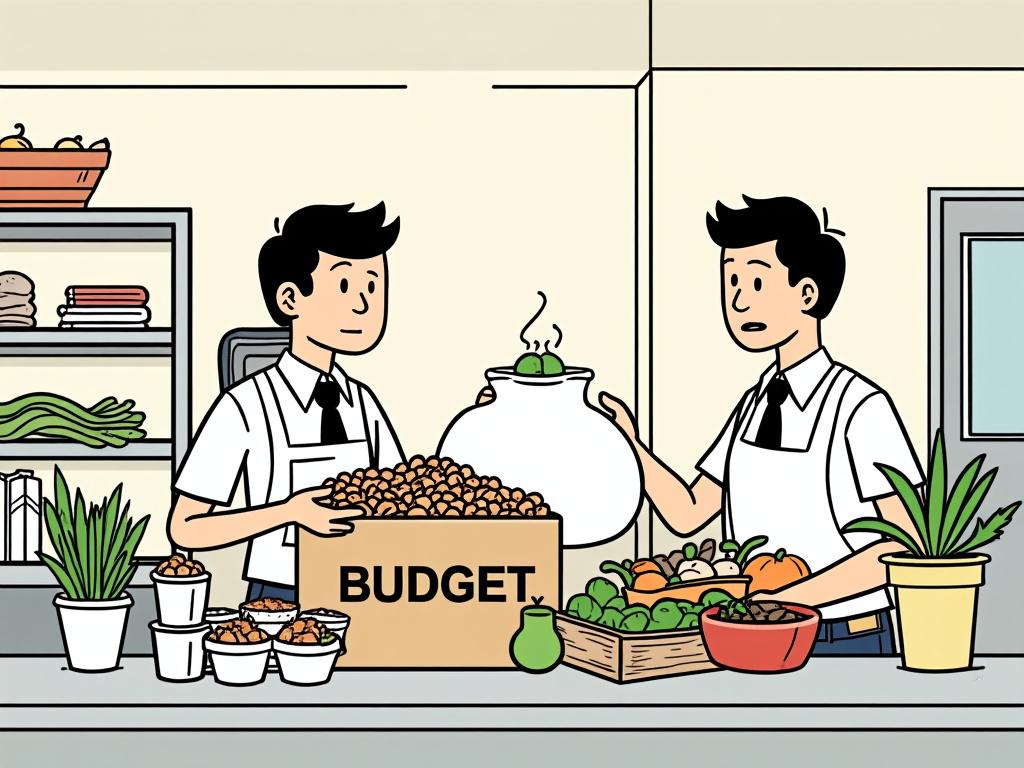
Greece Food Inflation 2025: Grocery Costs and Budget Planning
Reading time: 8 minutes
Table of Contents
- Understanding Greece’s Food Inflation Landscape
- Current Price Trends and Market Analysis
- Smart Budget Planning Strategies
- Practical Shopping and Saving Tips
- Future Market Predictions
- Your Financial Navigation Blueprint
- Frequently Asked Questions
Understanding Greece’s Food Inflation Landscape
Ever walked into your favorite Greek supermarket and felt like prices jumped overnight? You’re experiencing firsthand what economists have been tracking: Greece’s food inflation continues to challenge household budgets in ways that demand strategic thinking.
The reality hits differently when you’re standing in the grocery aisle, comparing prices to just months ago. Greece’s food inflation in 2025 isn’t just a number—it’s reshaping how families plan, shop, and eat across the country.
The Core Drivers Behind Rising Costs
Well, here’s the straight talk: Food inflation in Greece stems from multiple interconnected factors that create a perfect storm of rising prices. Energy costs, supply chain disruptions, and climate-related agricultural challenges have converged to create sustained pressure on food prices.
Key inflation drivers include:
- Energy price volatility affecting transportation and storage
- Climate impacts on domestic agricultural production
- Global supply chain reorganization costs
- Currency fluctuations affecting imported goods
- Labor shortages in agriculture and food processing
Consider Maria, a working mother from Thessaloniki, who noticed her weekly grocery bill increased by €35 over six months despite buying similar items. Her experience mirrors what’s happening nationwide—steady, persistent price increases that accumulate into significant budget impacts.
Regional Variations Across Greece
Food inflation doesn’t affect all Greek regions equally. Islands face higher transportation costs, while rural areas might have better access to local produce. Understanding these regional differences helps in planning more effective budget strategies.
For residents considering long-term planning in Greece, understanding economic trends becomes crucial for making informed decisions about living arrangements and financial planning, including considerations for those exploring the passport of greece opportunities.
Current Price Trends and Market Analysis
Let’s dive deep into the numbers that matter for your daily shopping decisions. Food inflation in Greece has shown distinct patterns across different product categories, with some items experiencing sharper increases than others.
Food Category Price Increases (2024-2025)
18%
15%
12%
14%
22%
Market Analysis: What the Numbers Really Mean
Quick Scenario: Imagine you’re planning your monthly grocery budget. What categories deserve your closest attention? The data shows that oils, fats, and dairy products have experienced the steepest price increases, making them priority areas for strategic shopping.
| Product Category | 2024 Average (€) | 2025 Projected (€) | % Change | Budget Impact |
|---|---|---|---|---|
| Weekly Groceries (Family of 4) | €85 | €98 | +15.3% | High |
| Fresh Meat (1kg) | €8.50 | €9.50 | +11.8% | Medium |
| Olive Oil (1L) | €4.20 | €5.15 | +22.6% | Very High |
| Fresh Produce (basket) | €12.00 | €13.80 | +15.0% | High |
| Dairy Products (weekly) | €18.50 | €21.80 | +17.8% | High |
Seasonal Patterns and Timing
Understanding seasonal price fluctuations can significantly impact your grocery budget. Summer months typically see fresh produce prices stabilize, while winter brings increases in imported goods and preserved foods.
Pro Tip: The right timing isn’t just about seasonal shopping—it’s about understanding market cycles to maximize your purchasing power throughout the year.
Smart Budget Planning Strategies
Ready to transform inflation challenges into strategic opportunities? Effective budget planning in an inflationary environment requires both defensive and offensive strategies.
The 50/30/20 Food Budget Adaptation
Traditional budgeting advice often falls short during inflationary periods. Here’s how to adapt your approach:
Practical Roadmap:
- Essential Foods (50%): Prioritize nutritionally dense staples
- Flexible Purchases (30%): Seasonal and sale-based buying
- Emergency Buffer (20%): Price spike protection fund
Take the example of Dimitris, a retiree from Athens, who restructured his monthly €200 food budget using this approach. By allocating €100 to essential staples, €60 to flexible purchases, and maintaining a €40 buffer, he maintained nutrition quality while absorbing price increases.
Strategic Shopping Timing
Successful budget management isn’t about perfection—it’s about strategic timing and pattern recognition. Markets show predictable patterns that savvy shoppers can leverage.
Key timing strategies:
- End-of-day shopping: Fresh items often discounted
- Mid-week visits: Less crowded, better selection
- Monthly bulk buying: Non-perishables during sales
- Seasonal stockpiling: Preserve summer abundance
Practical Shopping and Saving Tips
Let’s break down the essential tactics for navigating Greece’s current food market effectively. These aren’t theoretical concepts—they’re field-tested strategies that real families are using successfully.
Store Navigation and Selection
Different store types offer distinct advantages in an inflationary environment. Understanding when and where to shop can dramatically impact your grocery budget.
Strategic store selection:
- Discount chains: Best for packaged goods and cleaning supplies
- Local markets: Seasonal produce and direct-from-farmer prices
- Large supermarkets: Bulk buying and loyalty programs
- Specialty stores: Quality items during promotional periods
Technology-Assisted Shopping
Modern grocery shopping benefits significantly from technology integration. Apps and digital tools can help track prices, find deals, and optimize shopping routes.
Elena, a working professional from Patras, uses price comparison apps and digital loyalty programs to save approximately €45 monthly on her grocery bills—that’s over €500 annually just through smarter shopping technology.
Meal Planning Revolution
Meal planning isn’t just about organization—it’s about financial optimization. Strategic meal planning can reduce food waste by up to 40% while ensuring nutritional adequacy despite budget constraints.
Advanced meal planning strategies:
- Plan around seasonal produce cycles
- Incorporate flexible recipes that adapt to available ingredients
- Batch cooking to maximize energy efficiency
- Strategic leftover integration
Future Market Predictions
Understanding where Greece’s food market is heading helps inform both short-term tactics and long-term planning. Economic forecasts suggest continued volatility with potential stabilization in specific sectors.
Expert Predictions for 2025-2026
Agricultural economists predict that Greece’s food inflation will moderate but remain elevated compared to pre-2022 levels. Energy price stabilization and improved supply chain efficiency should provide some relief, particularly in processed foods and imported goods.
Projected trends:
- Gradual moderation in dairy and meat price increases
- Continued volatility in fresh produce due to climate factors
- Stabilization in grain-based products by late 2025
- Persistent elevation in premium and imported goods
Long-term Adaptation Strategies
Smart households are already adapting to what economists call the “new normal” of food pricing. This involves fundamental shifts in shopping habits, meal preparation, and budget allocation that go beyond temporary cost-cutting measures.
Your Financial Navigation Blueprint
Here’s your practical roadmap for mastering food budget management in Greece’s current economic environment. These aren’t just suggestions—they’re your step-by-step guide to financial resilience.
Immediate Action Steps (This Week):
- Audit Your Current Spending: Track every food purchase for seven days to establish your baseline
- Identify Price-Sensitive Categories: Focus on items showing the highest inflation rates in your shopping
- Create Your Buffer Fund: Set aside 15-20% of your monthly food budget as a price-spike protection reserve
Medium-Term Strategies (Next Month):
- Implement Strategic Shopping Timing: Test different stores and shopping times to identify optimal patterns
- Develop Seasonal Meal Plans: Build flexible menus that adapt to seasonal price fluctuations
- Establish Bulk Buying Protocols: Identify non-perishables worth stockpiling during sales
Long-Term Financial Resilience (3-6 Months):
- Master Market Timing: Develop intuitive understanding of price cycles and seasonal patterns
- Build Food Security Networks: Connect with local producers and community buying groups
- Optimize Your Food Investment Portfolio: Balance nutrition, enjoyment, and financial sustainability
The reality is that food inflation represents both challenge and opportunity. Those who adapt strategically won’t just survive these economic shifts—they’ll develop financial skills and habits that serve them long beyond the current inflationary period.
How will you transform your current food budget challenges into a foundation for long-term financial resilience? The strategies are here, the data is clear, and the tools are available—your success depends on consistent, strategic implementation starting today.
Frequently Asked Questions
How much should I expect my grocery budget to increase in 2025?
Based on current trends, expect a 12-18% increase in your overall grocery budget compared to 2024. However, strategic shopping and meal planning can help you minimize this impact to around 8-12%. Focus on reducing waste, buying seasonal produce, and taking advantage of bulk purchasing for non-perishables to stay closer to the lower end of this range.
Which Greek supermarket chains offer the best value during inflation?
Discount chains like Lidl and market-specific stores often provide the best overall value, with savings of 15-25% compared to premium supermarkets. However, the best strategy involves shopping at multiple stores: discount chains for packaged goods, local markets for fresh produce, and larger supermarkets for bulk items and promotional periods. Loyalty programs at stores like AB Vassilopoulos and Sklavenitis can also provide significant savings.
What are the most effective ways to reduce food waste while managing a tight budget?
Implement meal planning around perishable items first, use the “first in, first out” principle for pantry organization, and repurpose leftovers creatively. Store produce properly to extend freshness, freeze items before they spoil, and consider batch cooking to maximize ingredient usage. These strategies can reduce food waste by 30-40%, effectively stretching your budget while maintaining nutrition quality.

Article reviewed by Amelie Dufour, Co-Living Space Innovator | Urban Millennial Housing Solutions, on June 1, 2025
